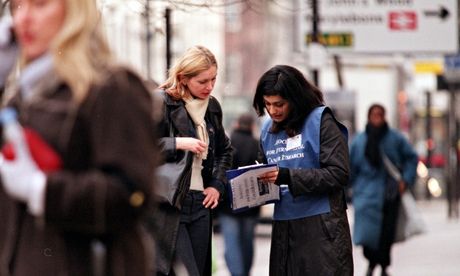Croydon in South London has become the latest town to sign up to a scheme banning ‘chuggers’ – charity muggers – who hassle members of the public for money.
The ‘stop and sign-up’ fundraisers, who stop people in the street and try to get them to sign up for a monthly direct debit donation, will be banned for four days a week including at weekends, the Telegraph reports.
The gangs, who are often on controversial less than minimum wage earning schemes, will also be limited in number to five per shift.
In Croydon, regulators have also restricted the number of street fundraisers to two small areas of the town centre.
Public Fundraising Regulatory Association chief executive Peter Hills-Jones said: “It is an effective and balanced way of regulating fundraising on the high street, allowing charities to raise money for good causes, but at the same time protecting the public.
“People complain that they often feel confronted when they are out shopping and agreements such as this ensure that fundraisers are sensitive to this in terms of where they position themselves and the number of days and people involved in fundraising.”
The chief executive of Croydon Business Improvement district said the decision was taken because the number of charity collectors, who congregate around busy shopping areas, getting in the way of people trying to go about their business by standing in their way on the pavement, has “been a concern for quite some time.”
Matthew Sims said the general public as well as businesses had “raised concerns about the level of charity collection in general across not just our town centre but I think nationwide.”
“This allows us in some form to manage that process. They will now only be able to work on Mondays, Wednesdays and Thursdays,” he said.
The latest signature to the agreement struck up by regulators comes as ministers announce plans for a Charities Bill which will ensure the third sector, as it is known, is more tightly regulated.
Last month it was discovered that 92-year-old poppy seller Olive Cooke had been bombarded with up to 200 charity begging letters a month.
The veteran fundraiser was found dead in Avon Gorge and there have been suggestions made the continual flood of unsolicited and often emotionally disturbing direct marketing may have contributed to her taking her own life.
The actions of the charities, who together sent Mrs Cooke an average of eight letters a day, were described by Chris Grayling MP as “wholly inappropriate.”
The leader of the House of Commons said all parties would support “making sure that charities operate in a way that is acceptable and frankly consistent with the role they are supposed to play”.
Charities are reliant on direct marketing for much of their fundraising, with regular donation and high profile campaigns usually providing the majority of the charity’s income for the year. Many charities have huge financial reserves in the millions and can afford to pay their staff generous incomes.
The need for tightening of regulations to control what have become known as ‘fake charities’ has also grown. These are organisations which blur the lines between state control and charities by receiving money from the government and also behaving in a heavy handed manner over lobbying.
Research by the Institute of Economic Affairs into a letter in The Times signed by 75 organisations accusing the Lobbying Act of ‘stifling’ debate about the ’causes of poverty’ found that 56 of them were charities, with at least 66 per cent in receipt of money from the government.
“In most cases their state funding makes up a very significant part of their income,” IEA Director of Lifestyle Economics Christopher Snowdon wrote. “For example, NAVCA—whose stated charitable purpose is to ‘exert influence on government policy’—relies on DfE, the Home Office, the Office for Civil Society, the Ministry of Justice, DoH and the lottery for most of its income. Concern Worldwide gets nearly £5 million per annum from DfID in addition to funds from the Scottish government. Children England gets more than 90 per cent of its income from the government, as does Keep Britain Tidy.”

COMMENTS
Please let us know if you're having issues with commenting.